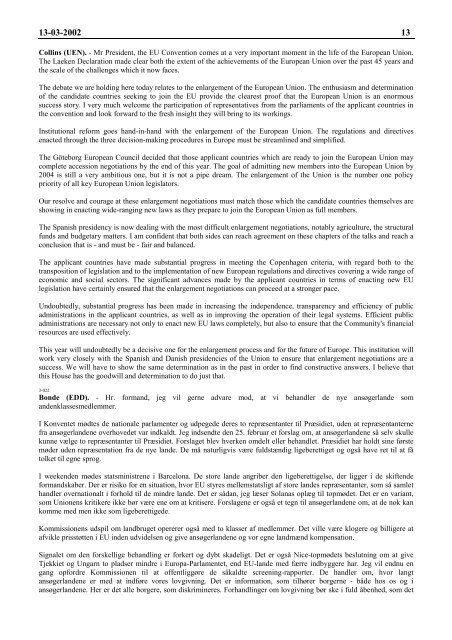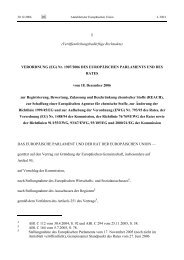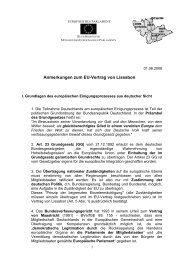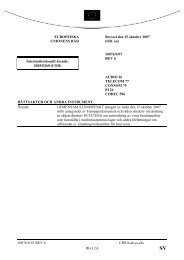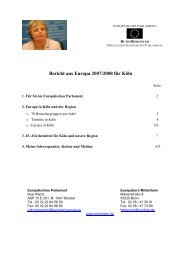mødet onsdag i den 13. marts 2002 sitzung am mittwoch i, 13. märz ...
mødet onsdag i den 13. marts 2002 sitzung am mittwoch i, 13. märz ...
mødet onsdag i den 13. marts 2002 sitzung am mittwoch i, 13. märz ...
Create successful ePaper yourself
Turn your PDF publications into a flip-book with our unique Google optimized e-Paper software.
13-03-<strong>2002</strong> 13<br />
Collins (UEN). - Mr Presi<strong>den</strong>t, the EU Convention comes at a very important moment in the life of the European Union.<br />
The Laeken Declaration made clear both the extent of the achievements of the European Union over the past 45 years and<br />
the scale of the challenges which it now faces.<br />
The debate we are holding here today relates to the enlargement of the European Union. The enthusiasm and determination<br />
of the candidate countries seeking to join the EU provide the clearest proof that the European Union is an enormous<br />
success story. I very much welcome the participation of representatives from the parli<strong>am</strong>ents of the applicant countries in<br />
the convention and look forward to the fresh insight they will bring to its workings.<br />
Institutional reform goes hand-in-hand with the enlargement of the European Union. The regulations and directives<br />
enacted through the three decision-making procedures in Europe must be stre<strong>am</strong>lined and simplified.<br />
The Göteborg European Council decided that those applicant countries which are ready to join the European Union may<br />
complete accession negotiations by the end of this year. The goal of admitting new members into the European Union by<br />
2004 is still a very <strong>am</strong>bitious one, but it is not a pipe dre<strong>am</strong>. The enlargement of the Union is the number one policy<br />
priority of all key European Union legislators.<br />
Our resolve and courage at these enlargement negotiations must match those which the candidate countries themselves are<br />
showing in enacting wide-ranging new laws as they prepare to join the European Union as full members.<br />
The Spanish presi<strong>den</strong>cy is now dealing with the most difficult enlargement negotiations, notably agriculture, the structural<br />
funds and budgetary matters. I <strong>am</strong> confi<strong>den</strong>t that both sides can reach agreement on these chapters of the talks and reach a<br />
conclusion that is - and must be - fair and balanced.<br />
The applicant countries have made substantial progress in meeting the Copenhagen criteria, with regard both to the<br />
transposition of legislation and to the implementation of new European regulations and directives covering a wide range of<br />
economic and social sectors. The significant advances made by the applicant countries in terms of enacting new EU<br />
legislation have certainly ensured that the enlargement negotiations can proceed at a stronger pace.<br />
Undoubtedly, substantial progress has been made in increasing the indepen<strong>den</strong>ce, transparency and efficiency of public<br />
administrations in the applicant countries, as well as in improving the operation of their legal systems. Efficient public<br />
administrations are necessary not only to enact new EU laws completely, but also to ensure that the Community's financial<br />
resources are used effectively.<br />
This year will undoubtedly be a decisive one for the enlargement process and for the future of Europe. This institution will<br />
work very closely with the Spanish and Danish presi<strong>den</strong>cies of the Union to ensure that enlargement negotiations are a<br />
success. We will have to show the s<strong>am</strong>e determination as in the past in order to find constructive answers. I believe that<br />
this House has the goodwill and determination to do just that.<br />
3-022<br />
Bonde (EDD). - Hr. formand, jeg vil gerne advare mod, at vi behandler de nye ansøgerlande som<br />
an<strong>den</strong>klassesmedlemmer.<br />
I Konventet mødtes de nationale parl<strong>am</strong>enter og udpegede deres to repræsentanter til Præsidiet, u<strong>den</strong> at repræsentanterne<br />
fra ansøgerlan<strong>den</strong>e overhovedet var indkaldt. Jeg indsendte <strong>den</strong> 25. februar et forslag om, at ansøgerlan<strong>den</strong>e så selv skulle<br />
kunne vælge to repræsentanter til Præsidiet. Forslaget blev hverken omdelt eller behandlet. Præsidiet har holdt sine første<br />
møder u<strong>den</strong> repræsentation fra de nye lande. De må naturligvis være fuldstændig ligeberettiget og også have ret til at få<br />
tolket til egne sprog.<br />
I weeken<strong>den</strong> mødes statsministrene i Barcelona. De store lande angriber <strong>den</strong> ligeberettigelse, der ligger i de skiftende<br />
formandskaber. Der er risiko for en situation, hvor EU styres mellemstatsligt af store landes repræsentanter, som så s<strong>am</strong>let<br />
handler overnationalt i forhold til de mindre lande. Det er sådan, jeg læser Solanas oplæg til top<strong>mødet</strong>. Det er en variant,<br />
som Unionens kritikere ikke bør være ene om at kritisere. Forslagene er også et tegn til ansøgerlan<strong>den</strong>e om, at de nok kan<br />
komme med men ikke som ligeberettigede.<br />
Kommissionens udspil om landbruget opererer også med to klasser af medlemmer. Det ville være klogere og billigere at<br />
afvikle prisstøtten i EU in<strong>den</strong> udvidelsen og give ansøgerlan<strong>den</strong>e og vor egne landmænd kompensation.<br />
Signalet om <strong>den</strong> forskellige behandling er forkert og dybt skadeligt. Det er også Nice-top<strong>mødet</strong>s beslutning om at give<br />
Tjekkiet og Ungarn to pladser mindre i Europa-Parl<strong>am</strong>entet, end EU-lande med færre indbyggere har. Jeg vil endnu en<br />
gang opfordre Kommissionen til at offentliggøre de såkaldte screening-rapporter. De handler om, hvor langt<br />
ansøgerlan<strong>den</strong>e er med at indføre vores lovgivning. Det er information, som tilhører borgerne - både hos os og i<br />
ansøgerlan<strong>den</strong>e. Her er det alle borgere, som diskrimineres. Forhandlinger om lovgivning bør ske i fuld åbenhed, som det


